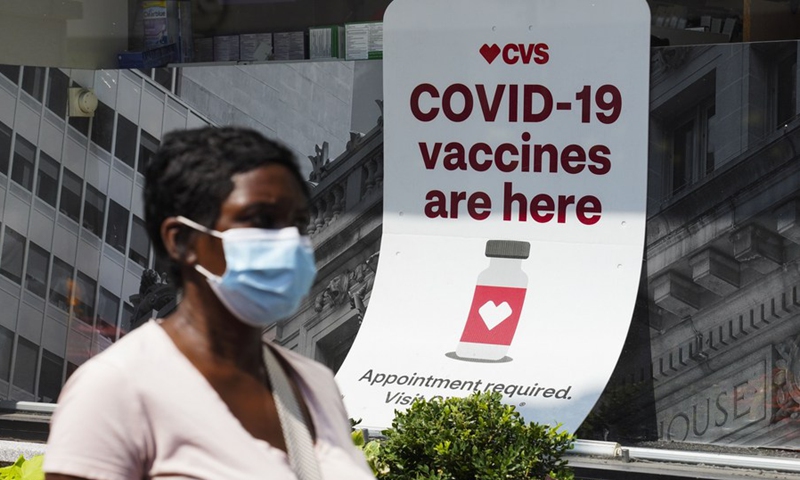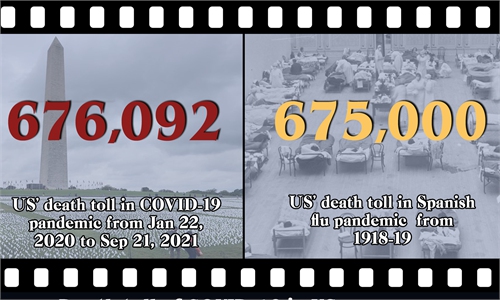US 'vaccine passport' policy prompts suspicions
Discrimination concerns, poor credibility, virus control cited by experts

A person walks past a sign of COVID-19 vaccination at a pharmacy in New York, the United States, Aug. 11, 2021. (Photo: Xinhua)
A hasty "vaccine passport" will create inoculation discrimination against people from developing countries with limited access to COVID-19 vaccines, and it may also encumber global epidemic control efforts, said Chinese epidemic observers on Wednesday.
The remarks came after the White House on Monday announced that the US will exempt fully vaccinated foreigners from quarantine starting in November, if the traveler can present proof of inoculation and a negative test report within the previous three days.
Meanwhile, unvaccinated US citizens are required to submit a test report taken within 24 hours and book a test upon arrival to return to the US.
Zeng Guang, former chief epidemiologist of the Chinese Center for Disease Control and Prevention, told the Global Times on Wednesday that the US announcement was made out of comprehensive concerns about public health, economics and politics rather than an epidemic control-wise decision.
A Beijing-based immunologist told the Global Times on condition of anonymity that based on eased policies for the vaccinated and tightened policies for unvaccinated citizens, the Biden administration wanted to use the policy change to boost the domestic vaccination pace, which is stagnant.
The US has hoarded huge amounts of doses but only 55 percent of its population have completed the vaccination process.
The immunologist also noted the risk that a "vaccine passport" will create discrimination against citizens of developing countries that barely have access to vaccines.
In January 2020, former US president Donald Trump announced a complete ban on travelers who had been to China. The EU countries, the UK and Ireland, as well as South Africa, Brazil and India, were later added to the list.
US President Joe Biden upheld these bans after taking office.
The US' "vaccine passport" gave some countries an advantage while keeping the door shut for other countries.
The World Health Organization (WHO) warned on September 14 that the use of vaccine passports at this stage in the pandemic would fuel discrimination.
According to the White House, the US Center for Disease Control (US CDC) would decide which vaccines are acceptable and the implementation details, including whether Chinese and Russian vaccines count, will come out by early November.
The New York Times cited the US CDC as saying that vaccines approved for emergency use by the WHO will be valid proof to enter the US.
But Chinese experts expressed concerns on whether the US will fulfill its pledges all the time, showing low confidence in the credibility of the US government.
"What if it announced plans to recognize Chinese vaccines but later scrapped that without compensation for Chinese travelers who have booked itineraries? What if the US blackmails China by threatening to cancel the approval?" the immunologist asked.
Since the Delta variant has already devoured the US at the community level, exempting foreign arrivals from quarantine won't change the epidemic control situation in the country, Zeng said.
But other experts said that if the policy drives many Americans to travel abroad, it would definitely complicate global control efforts.
Leaders of European countries, including British Prime Minister Boris Johnson, welcomed the US move to ease its travel bans, which are among the strictest in the world.
Reaction to the US policy change prompted reasonable speculation that the decision was made out of geopolitical concerns, as Biden wanted to soothe the US' transatlantic allies, who eased travel restrictions on US citizens during the summer.
Airlines and other travel industry groups have clamored for the US to lift the restrictions for months, according to US media. Shares of American Airlines, Delta Air Lines and United Airlines rose after the announcement amid a broader market sell-off.
Observers believed that family reunions will be easier and some international tourists may return, but it is unclear how much the US move can support its own economy, not to mention the impact on the world.
Chinese tourists, who were robust consumers worldwide before the pandemic, are still cautious about traveling abroad due to COVID-19, despite showing higher willingness than in 2020, multiple polls have suggested.
Even if they decide to travel abroad, Chinese will not put the US, which has seen the coronavirus spread wildly and has diplomatic tensions with China, high on their lists, Wang Nan, a travel agent told the Global Times.
Wang has suffered great difficulties and shifted from overseas trips to domestic business.
Having been in a "zero case" situation, Chinese travelers evaluate the safety of international travel according to a totally different benchmark, Wang said.
An expert at the Chinese Center for Disease Control and Prevention told the Global Times that China will continue the "dynamic zero case" approach rather than hastily ease its border controls based on "vaccine passports."
China's border policies have been established through practice and are suitable for the country. They are also non-discriminatory, experts said.
For China, maintaining the current policy is based on the current global and domestic situations.
There's no timeline as to when China will lift the border restrictions, but a number of requirements must be met before such a move, the Chinese CDC expert said, citing a higher vaccination rate, more studies on protection rates (including booster doses and renewed vaccines), progress in COVID-19 treatment, and readiness of the medical system as some prerequisites.
Before that, a hasty opening-up will result in unimaginable consequences, the expert warned.

